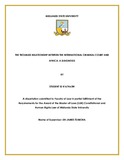Please use this identifier to cite or link to this item:
https://cris.library.msu.ac.zw//handle/11408/3134| Title: | The troubled relationship between the International Criminal Court and Africa: a diagnosis | Authors: | Msipa, Sithembinkosi | Keywords: | International Criminal Court African states Relationship |
Issue Date: | 2017 | Publisher: | Midlands State University | Abstract: | The debate around the relationship between the International Criminal Court and African states has gained more prominence over the past decade, especially in light of the ever increasing atrocities not only on the African continent itself but around the globe as amply demonstrated on the increasing cost of civilian life in Georgia Syria and Gaza just to mention a few. Unfortunately, the debate has only been largely centred around two clear and entrenched positions, that is the Court biased against Africa and that the Court is simply not biased but working where the need is the greatest. This thesis is a response to an engagement with this debate. It critically examines the arguments from both sides of the aisle that is whether or not the ICC is biased against the African continent or simply focusing on it because the greatest number of internal conflicts are occurring there. Despite the often persuasive claims from both sides, with many of the arguments having a certain amount of merit, this thesis posits a different and novel position. It argues that that the issue is not a stark black and white as it may at first seem. It argues that it would be short-sighted to focus solely on the Court as biased or not biased against the African continent without taking into account that the Court operates in a global geopolitical context and thus may be used to achieve political ends not only by the more powerful states but even by African leaders themselves. The thesis makes the point that the effectiveness of the Court is dependent on two factors, the consent of the state concerned and in its absence referral of a situation to the Court by the United Nations Security Council. Ultimately both factors have pitfalls and open the Court to be either abused for the attainment of political ends or be stonewalled from carrying out its mandate if it is not politically expedient. The argument is therefore made that rather than lay the blame squarely at the door of the Court as being responsible for its often negative relationship with African states, one should consider that the Court can and has been abused for political ends thus contributing to its perceived bias. It therefore argues that the Court should sail above the politics. Rather than challenge African states as merely grandstanding to avoid its scrutiny, the Court could meet its African criticisms head on and engage in honest dialogue with African states in order to build bridges that would help it operate more effectively on the continent. At the same time, rather than trying to navigate the political minefield with each situation, the Court would do better in the fight against impunity if it assisted African states to capacitate their judicial systems to deal with international crimes and only step in when the state concerned has truly failed or is unwilling to prosecute. When the Court is seen as truly a Court of last resort rather than a busybody which steps in where it is not wanted or does the bidding of more powerful nations, it may soften the attitude of African states towards the Court. | URI: | http://hdl.handle.net/11408/3134 |
| Appears in Collections: | Master of Laws: Constitutional and Human Rights Law |
Files in This Item:
| File | Description | Size | Format | |
|---|---|---|---|---|
| THESIS FOR S. MSIPA-R167463W.pdf | Full Text | 1.13 MB | Adobe PDF |  View/Open |
Page view(s)
134
checked on Feb 26, 2025
Download(s)
94
checked on Feb 26, 2025
Google ScholarTM
Check
Items in MSUIR are protected by copyright, with all rights reserved, unless otherwise indicated.


